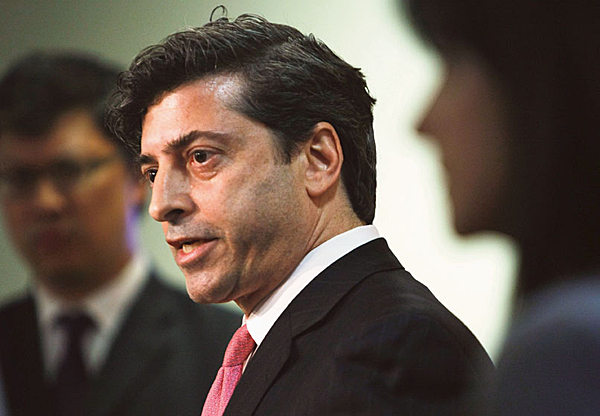Alumni Gazette
 SIGNAL APPOINTMENT: Since his appointment as the SEC’s new enforcement director, Robert Khuzami ’79 has made a point of sending strong signals that “the SEC is on the beat.” (Photo: Getty Images)
SIGNAL APPOINTMENT: Since his appointment as the SEC’s new enforcement director, Robert Khuzami ’79 has made a point of sending strong signals that “the SEC is on the beat.” (Photo: Getty Images)Robert Khuzami ’79, who became the new director of enforcement at the Securities and Exchange Commission in March, does not lack for a sense of calling.
“I left the kind of job one would hope to get after being a regulator, in order to take this job,” says the former federal prosecutor and, most recently, general counsel for the Americas at Deutsche Bank.
According to one senator, who serves on the committee that oversees the SEC, Khuzami’s task will be a long battle. “Once the wrong culture takes hold of an agency, it takes a real crusade to change it,” Sen. Charles Grassley of Iowa, the senior Republican on the Senate Finance Committee, said early this year.
Created by President Franklin Roosevelt during the Great Depression to guard against financial scandals and help restore the confidence of investors, last fall the SEC was the object of bipartisan condemnation, above all for failing to pursue the evidence against now convicted financier Bernard Madoff that had mounted for nearly a decade.
In January, President Barack Obama appointed Mary Schapiro to chair the SEC, and she, in turn, made the recruitment of Khuzami one of her first initiatives. Today there is widespread agreement that a crusade to transform the SEC is well under way.
Khuzami, who was elected Phi Beta Kappa at Rochester while working a variety of jobs on loading docks and painting crews to pay his living expenses and to save money for law school, cut his teeth in the U.S. Attorney’s Office for the Southern District of New York. Many of the most recognized names in the American legal and political communities have served in that office, among them Robert Morgenthau, Rudolph Guiliani, and Michael Mukasey. And although he is best known for his conviction of Omar Ahmed Ali Abdel Rahman in the 1993 bombing of the World Trade Center, Khuzami also led the U.S. Attorney’s Office’s Securities and Commodities Fraud Task Force, prosecuting several notable cases of financial wrongdoing.
At the SEC, he must decide among the extraordinary number of tips (over 700,000 in 2008), which ones the agency’s attorneys should pursue. And unlike in past years, in which, as critics allege, the SEC looked past multibillion dollar scammers and pursued smaller-time (and less well-connected) wrongdoers, Khuzami indicates that he will “target those areas of misconduct responsible for a great deal of harm.”
Khuzami relayed that approach—which he calls being “strategic”—to his staff of over 700 attorneys in April, during his first week on the job. It’s the first of an approach he calls the “4 S’s”—strategic, smart, swift, and successful.
While the need to be “smart” may sound self-evident, Khuzami aims to transform the structure of the enforcement division to make better use of limited resources. With input from the approximately 1,100 staff members in the division, Khuzami wants to ensure that experienced investigators spend as much of their time as possible working on cases rather than managing staff. In July, Khuzami eliminated the lowest level of management in the division, reassigning the one-time “branch managers” to higher-level management positions or to investigations.
More significantly, Khuzami believes that being smart means reorganizing the division to create offices focused on areas of specialty within the financial services industry. Gathering experts together, Khuzami says, may help investigators see “patterns, links, trends, and motives.”
As for the third “S” of “swiftness,” he says, “You get the best deterrent impact if you bring a case in close proximity, so the public recognizes that justice is being done quickly.”
In July, the SEC released figures showing that, since January, the enforcement division has doubled the number of emergency actions to stop fraud.
“The heightened activity has prompted renewed pride inside the enforcement division,” says Zachary Goldfarb, who covers the SEC for the Washington Post.
And, says Khuzami, it sends “a strong message to would-be violators that the SEC is on the beat.”
